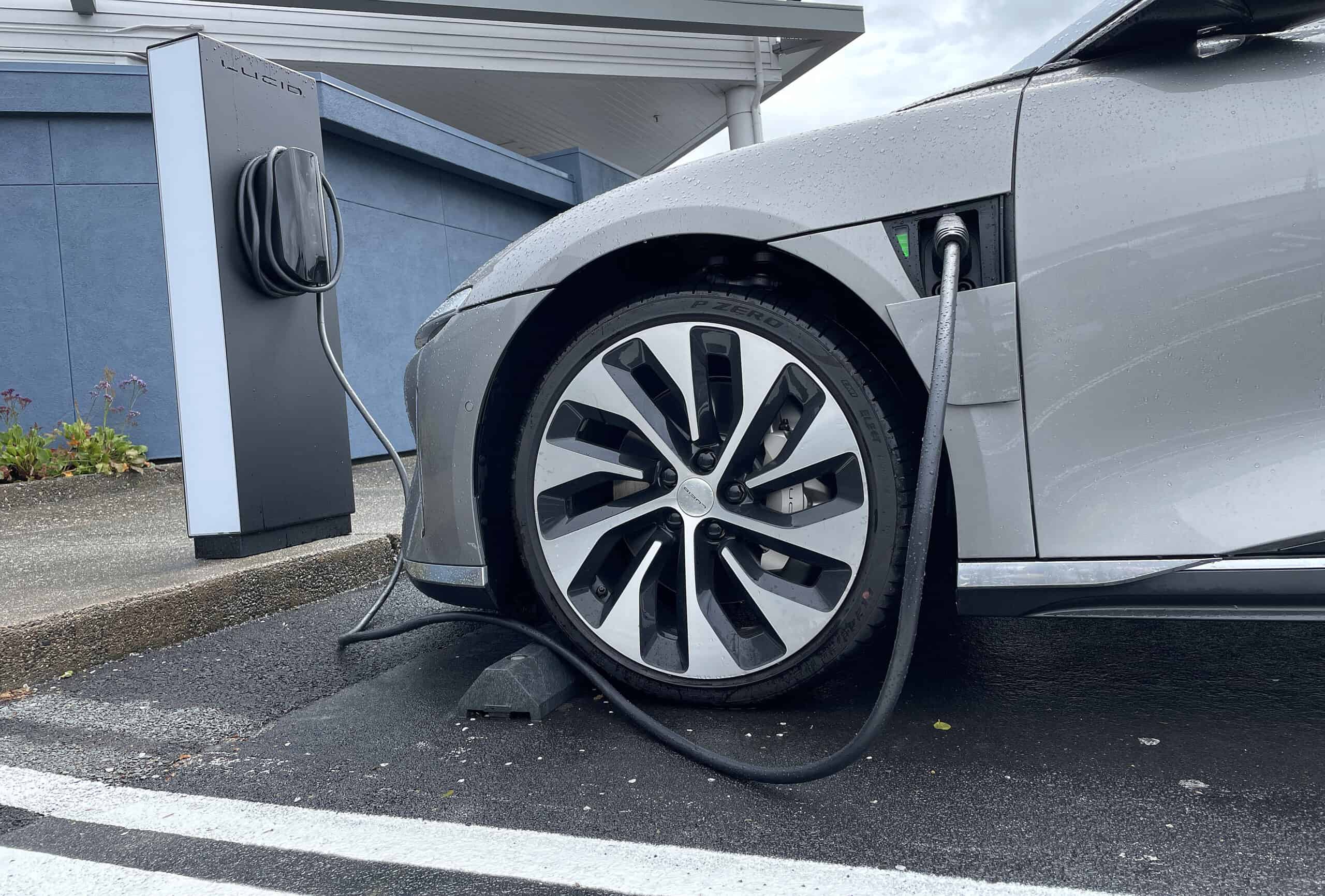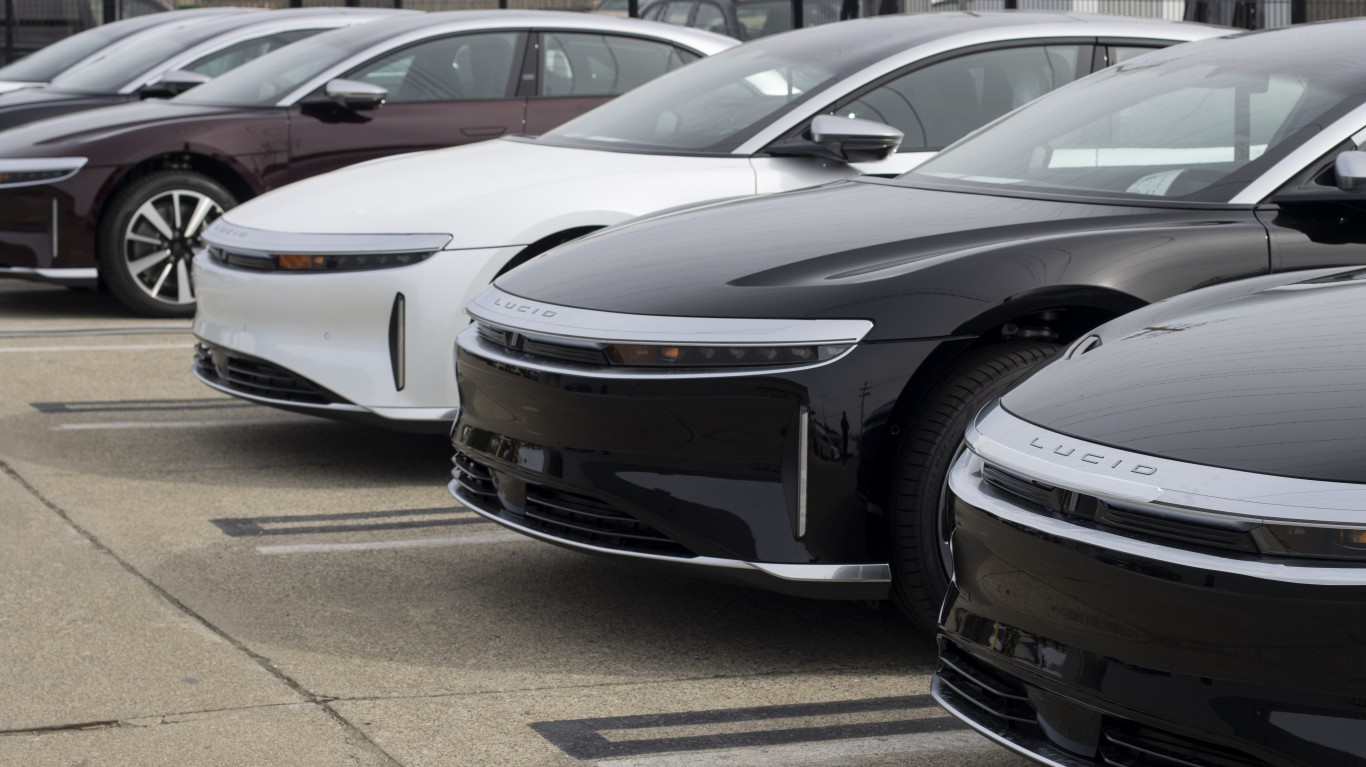
24/7 Wall St. Insights
- Lucid Group Inc. (NASDAQ: LCID) stock may have its proponents.
- However, the problems the luxury EV maker faces are myriad.
- Also: Discover 2 dividend legends to hold forever.
Just a few short years ago, advances in battery and charging technology were making electric vehicles (EVs) a viable option for a wider range of consumers. In a world facing climate change concerns, as well as high oil and fuel prices, EVs were supposed to be the next big thing. The major automakers sunk millions of dollars into EV investments, and a rash of startups popped up worldwide. Tesla had early success, but soon more models from more makers became available. Consumer reluctance started to melt. Then, unexpectedly, demand began to wane a year or so ago.
EV makers began to struggle, some resorting to price cuts they could little afford in an attempt to hold on to scraps of market share. Many startups, including Fisker and Lordstown, failed. One of those struggling companies is Lucid Group Inc. (NASDAQ: LCID). It does have a number of optimistic proponents, but the question for investors is whether the stock will soar or go down the drain.
Why Invest in Lucid?

Lucid stock is down over 84% since it went public. Though shares once traded for more than $57 apiece, they were last seen changing hands for near $4.
The company says its mission is to inspire people to use sustainable energy by creating luxury EVs that are intuitive, liberating, and efficient. The Lucid Air, its first model, has won U.S. News & World Report’s Best Luxury Electric Car award for three years in a row. The company also supplies powertrain technology to other automakers, including Aston Martin, and batteries to the Formula E racing series.
The company does not offer a dividend. The stock underperformed the S&P 500 in 2023, ending the year down more than 38%. The question is whether there is any reason to believe the shares will rebound.
Lucid, the Company

This technology company designs, engineers, manufactures, and sells EVs, EV powertrains, and battery systems. It also designs and develops proprietary software in-house for Lucid vehicles. The company sells vehicles directly to consumers through its retail sales network and direct online sales, including Lucid Financial Services.
Lucid is headquartered in Newark, California, which is in Silicon Valley. The company was founded in 2007. It completed a special purpose acquisition company (SPAC) merger on July 26, 2021, and began trading on Nasdaq. The company competes with or is similar to Nio Inc. (NYSE: NIO), Rivian Automotive Inc. (NASDAQ: RIVN), Tesla Inc. (NASDAQ: TSLA), and XPeng Inc. (NYSE: XPEV).
The company’s CEO has touted the Lucid SUV due out later this year and claims to be overtaking Tesla’s leadership. The stock got a notable boost on recent news of $1.5 billion funding from Saudi Arabia. Second-quarter results also sent shares higher. Note that Lucid did issue recalls earlier this year.
The Trouble With Lucid

Unfortunately, this EV maker does not have just one problem. The challenges that Lucid faces are myriad. One of the biggest issues for investors is that the company keeps reporting sizable quarterly losses, including a total of $2.7 billion over the past year. Production and delivery issues have contributed to those losses.
The pricing of Lucid vehicles is also an issue, with most models costing over $100,000. This leads to low volume and low profit margins, especially in an EV market crowded with competitors that are cutting prices because demand for these vehicles has waned.
Besides the price tag problem, there are some safety concerns as well. This summer, the National Highway Traffic Safety Administration (NHTSA) issued a recall for certain Lucid Air models.
The result of all this is that Lucid is burning through cash faster than its reported losses. Speculation is that, despite the funding from Saudi Arabia meant to keep the company running through 2025, Lucid could find itself in a debt squeeze sooner than that.
Expectations for Lucid Stock

The share price is more than 4% lower than at the beginning of the year. In that time, the S&P 500 is up 18% or so. Note that the $3.17 consensus price target is less than the current price and the 52-week high of $6.45. None of the 15 analysts who cover the stock recommend buying shares.
Institutional investors hold more than 71% of shares. Saudi Arabia’s Public Investment Fund has a stake of nearly 60%. Nearly 865 million shares, or about 29% of the float, are held short. And note that an executive at the carmaker sold almost 90,000 shares of the stock last month.
Three EV Stocks With Troubles Ahead
Take Charge of Your Retirement In Just A Few Minutes (Sponsor)
Retirement planning doesn’t have to feel overwhelming. The key is finding expert guidance—and SmartAsset’s simple quiz makes it easier than ever for you to connect with a vetted financial advisor.
Here’s how it works:
- Answer a Few Simple Questions. Tell us a bit about your goals and preferences—it only takes a few minutes!
- Get Matched with Vetted Advisors Our smart tool matches you with up to three pre-screened, vetted advisors who serve your area and are held to a fiduciary standard to act in your best interests. Click here to begin
- Choose Your Fit Review their profiles, schedule an introductory call (or meet in person), and select the advisor who feel is right for you.
Why wait? Start building the retirement you’ve always dreamed of. Click here to get started today!
Thank you for reading! Have some feedback for us?
Contact the 24/7 Wall St. editorial team.





